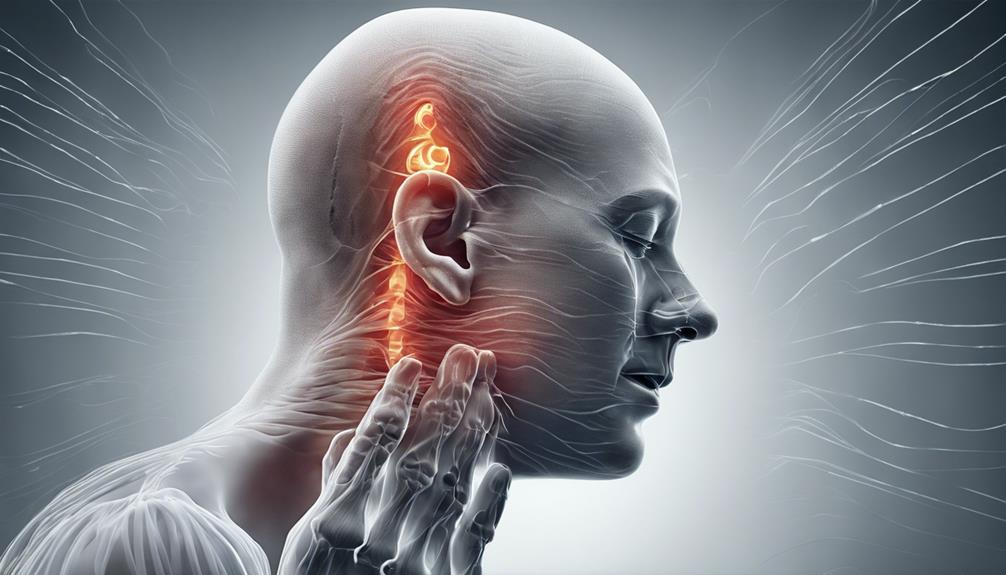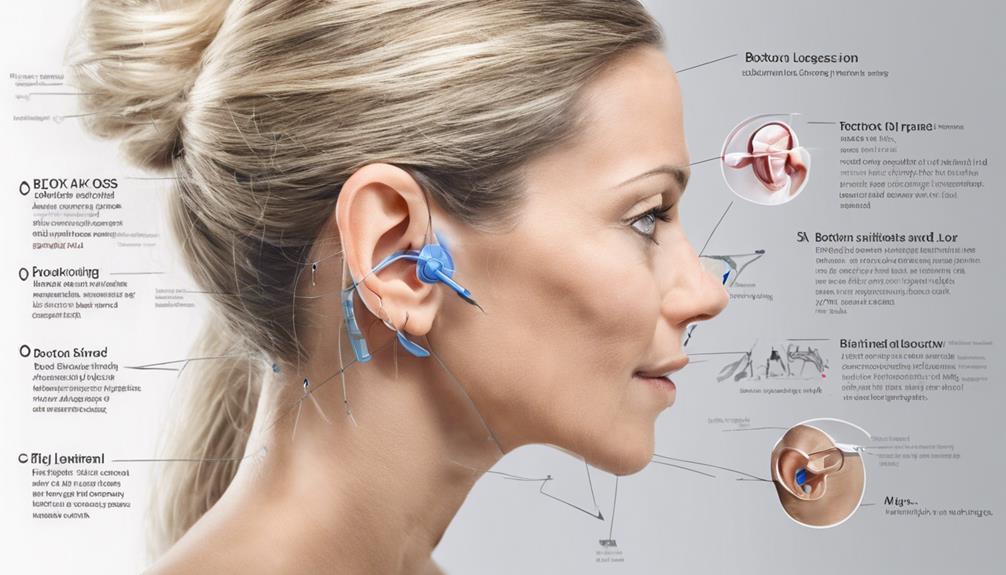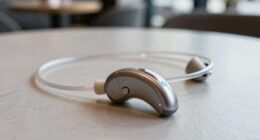Many people may not realize that an untreated sinus infection could eventually result in permanent hearing loss. The intricate connection between sinus inflammation and our ability to hear can have long-lasting impacts on our hearing abilities.
As we explore the intricate mechanisms behind this phenomenon, it becomes crucial to understand the warning signs, preventative measures, and possible treatments that could safeguard our hearing health. Understanding the gravity of this issue is vital to protecting one of our most precious senses.
Key Takeaways
- Sinus infections can lead to temporary or permanent hearing loss due to Eustachian tube dysfunction.
- Fluid buildup in the middle ear from sinusitis can cause conductive hearing loss.
- Timely treatment and understanding of symptoms are crucial to prevent irreversible hearing damage.
- Addressing sinusitis promptly with medications and proper management can help prevent hearing loss.
Impact of Sinus Infection on Hearing
Sinus infections can detrimentally affect hearing, potentially leading to temporary or permanent loss. When sinusitis occurs, the inflammation and congestion can impact the Eustachian tube's ability to regulate pressure within the ear. This dysfunction can result in a feeling of fullness in the ear, decreased ability to hear, and even sharp pain. Additionally, the presence of fluid in the ear due to sinus infections can cause a conductive hearing loss, where sound is unable to travel effectively through the ear structures.
If left untreated, chronic sinusitis can lead to long-term damage to the delicate cochlear structures responsible for translating sound waves into neural signals. Prompt treatment of sinus infections is essential to prevent irreversible harm to hearing. Monitoring for symptoms such as persistent ear pain, pressure, or changes in hearing acuity is crucial in catching and addressing sinus-related hearing issues early to mitigate the risk of permanent hearing loss.
Mechanism of Hearing Loss in Sinusitis

When sinusitis triggers inflammation in the Eustachian tube, it disrupts middle ear pressure regulation, potentially leading to auditory impairment. This disruption can have various consequences on the mechanisms involved in hearing.
- Eustachian Tube Blockage: Inflammation in the sinuses can cause swelling that impacts the Eustachian tube, leading to a blockage. This blockage can prevent the equalization of pressure in the middle ear, affecting sound transmission.
- Fluid Buildup: Sinus infections can result in the accumulation of fluid in the middle ear. This fluid buildup not only interferes with sound conduction but can also create an environment conducive to bacterial growth, further complicating the infection.
- Pressure Imbalances: The pressure imbalances caused by sinusitis can trigger symptoms like tinnitus, ear pain, and hearing difficulties. These imbalances, if persistent, can contribute to permanent hearing loss and other complications if not addressed promptly.
Understanding the intricate relationship between sinusitis, the Eustachian tube, and the middle ear is crucial in comprehending how sinus infections can lead to long-term hearing issues.
Signs of Permanent Hearing Damage
Permanent hearing damage resulting from sinus infections typically presents as sensorineural hearing loss, indicating damage to the inner ear or auditory nerve. This type of hearing loss, often associated with sinusitis, can lead to long-term hearing difficulties.
Individuals experiencing permanent hearing damage from sinus infections may notice a gradual or sudden decrease in their ability to hear sounds clearly. Ear pain, alongside symptoms of sinusitis such as congestion, facial pressure, and headaches, can signify potential inner ear involvement.
The eustachian tubes, responsible for equalizing pressure in the ears, may also be affected by the bacterial infection causing sinusitis, contributing to hearing issues. If left untreated, sinus infections can progress, leading to more severe complications like permanent hearing damage.
Recognizing these signs and seeking prompt medical attention for sinus infections is essential in preventing irreversible harm to the auditory system. Understanding the connection between sinus infections and hearing can aid in early intervention and management to safeguard against permanent hearing loss.
Preventing Hearing Loss From Sinus Infections

Recognizing the importance of prompt treatment for sinus infections, effective management strategies can significantly reduce the risk of permanent hearing loss associated with these conditions. When aiming to prevent hearing loss from sinus infections, it's crucial to address the underlying issues causing potential damage to the auditory system.
Here are three key strategies to help mitigate the risk of permanent hearing loss related to sinusitis:
- Proper Treatment of Sinus Infections: Timely and appropriate treatment of sinus infections can prevent complications like fluid buildup in the ear, which may lead to hearing problems.
- Managing Sinusitis Symptoms: Utilizing medications, decongestants, and saline sprays as prescribed can help alleviate symptoms such as ear pain and prevent further complications that may impact hearing.
- Understanding Eustachian Tube Function: Educating oneself about the role of the Eustachian tube in regulating pressure within the ear and sinus cavities can aid in taking preventive measures to safeguard against potential hearing loss.
Treatment Options for Sinusitis-Related Hearing Loss
Treatment options for sinusitis-related hearing loss typically involve a combination of antibiotics, decongestants, antihistamines, mucolytics, and in some cases, procedures like balloon sinuplasty. Antibiotics are crucial in treating bacterial infections that can lead to sinusitis-related ear issues. Decongestants play a vital role in reducing nasal congestion and relieving pressure on the Eustachian tube, which can help improve hearing. Antihistamines are beneficial for managing allergies that may exacerbate sinusitis, potentially lowering the risk of hearing loss. Mucolytics are used to thin mucus in the sinuses, aiding in drainage and alleviating ear pressure associated with sinus infections. In more severe or chronic cases impacting hearing, balloon sinuplasty, a minimally invasive procedure, can provide long-term relief. This comprehensive treatment plan aims to address the underlying causes of sinusitis-related hearing loss effectively.
| Treatment | Description |
|---|---|
| Antibiotics | Treat bacterial infections contributing to sinusitis-related ear problems. |
| Decongestants | Reduce nasal congestion and alleviate pressure on the Eustachian tube, improving hearing. |
| Antihistamines | Manage allergies linked to sinusitis, potentially decreasing the risk of hearing loss. |
| Mucolytics | Thin mucus in the sinuses, promoting drainage and relieving ear pressure from sinus infections. |
Frequently Asked Questions
Can You Permanently Lose Your Hearing From a Sinus Infection?
Yes, sinus infections can lead to permanent hearing loss. Prolonged sinus issues can damage delicate ear structures, causing irreversible sensorineural hearing loss.
Chronic inflammation from sinusitis affects the cochlea, while sinus-Eustachian tube connections can contribute to lasting hearing impairment. Damage to cochlear hair cells due to chronic sinus infections can result in permanent hearing deficits.
Timely and effective sinus infection management is crucial to prevent long-term complications like hearing loss.
What Does an ENT Do for Chronic Sinusitis?
When dealing with chronic sinusitis, ENT specialists may recommend treatments like antibiotics, nasal corticosteroids, or sinus surgery. Procedures such as endoscopic sinus surgery can help improve sinus drainage and alleviate symptoms. Additionally, allergy testing and immunotherapy may be provided to address underlying allergies.
Lifestyle modifications like saline nasal irrigation and allergen avoidance can also aid in managing chronic sinusitis. Regular follow-up appointments with an ENT are crucial for monitoring progress and adjusting treatment plans.
How Long Does It Take to Fully Recover From Sinusitis?
Recovering from sinusitis resembles a marathon; it varies based on type and severity. Acute cases can resolve in a week with treatment, while chronic ones may linger longer. Antibiotics and decongestants speed up healing.
Rest, hydration, and steam inhalation aid recovery. Follow-up appointments ensure complete healing. It's crucial to monitor progress for a full recovery.
How Can I Get My Hearing Back From Sinuses?
When dealing with sinus-related hearing loss, treatment typically involves addressing the underlying sinus infection. Clearing sinus inflammation and reducing pressure on the Eustachian tube can aid in restoring hearing function.
Seeking guidance from a healthcare professional, such as an ENT specialist, can provide tailored treatment options for improving hearing affected by sinus issues.
Effective management of sinusitis symptoms can promote the recovery of hearing loss associated with sinus infections.
Conclusion
In the intricate symphony of sinus infections and hearing loss, the delicate balance of cochlear function can be disrupted, leading to potential permanent damage.
Like a fragile melody, the connection between sinusitis and hearing loss requires careful attention and timely intervention to preserve the harmonious sounds of life.
By understanding the mechanisms at play and taking proactive measures, we can protect the intricate auditory system from the discordant effects of sinus infection-related hearing loss.











